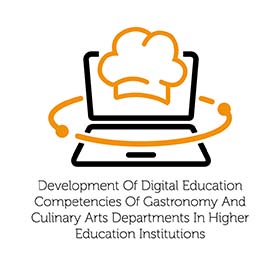Technology and digitalization are continually changing and developing, especially in the fields of military, health, agriculture, transportation, communication, and education. With the digitalization process of educational environments, many educational institutions have started to implement various activities such as distance education, seminars, and workshops. The research conducted by the JRC between 2016 and 2017 on digital education policies is built on three main topics. These are respectively, “21st-century skills and competencies ”, “innovative and modernized education and training” and “open access education”.
This project is designed to take into account the three main issues mentioned above. Europe 2020 innovative and modernized education and training strategy title is one of the topics emphasized explicitly for the project. In addition, topics such as the agenda for new skills and jobs, digital plan, and innovation union, which are among the Europe 2020 strategy agendas, are also addressed in our project.
Until recently, educational activities were carried out with restrictions such as place, time, and person. Today, education is done through distance, online or blended education models. Especially with the COVID-19 outbreak, many universities worldwide have decided to implement distance education to reduce contagiousness. While gastronomy education, which is carried out with theoretical and practical training activities, tries to adapt itself to digital education practices, the digital education competencies of academicians who provide gastronomy education should also be developed.
It is seen that there are no standards and principles regarding DIGI-GASE throughout Europe. Creating a guide and digital education material that will help higher education institutions and academicians providing gastronomy education in digital education will ensure higher quality and effective gastronomy education. In this context, the DIGI-GASE project aims to improve the digital gastronomy education competencies of academicians who teach gastronomy at higher education institutions. The project also aims to prepare a guide to lead universities in the transition to digital gastronomy education.
During its lifetime (24th months) the European partnership composed of the Universita degli studio di science gastronomiche (Italy), the Institut Paul Bocuse – Application (France), the European Digital Learning Network (Italy), and the E.A.C.E. – European Academy of Certified Education gGmbH (Germany), with the scientific manager Prof. Dr. Ozlenen OZKAN together with the Akedeniz University researchers Assoc. Prof. Ceyhun Cağlar KILINC, Assist. Prof. Dr. Ramazan EREN and Assist. Prof. Dr. Abdullah TARINC will work in symbiosis to achieve the following goals:
- Preparation of innovative digital gastronomy education guide to be used by higher education institutions and academicians providing gastronomy education.
- Preparation of digital educational material to be used by higher education institutions and academicians providing gastronomy education.
- Establishing a network of institutions and people interested in digital gastronomy education.
- Increasing the digital education competencies of academicians by providing gastronomy education with the innovative guide and training material to be created.
- Raising awareness of DIGI-GASE in higher education institutions that provide gastronomy education throughout the EU and establishing dissemination activities aimed at gaining a holistic approach.
Therefore, the project outputs that will emerge with this project will be aimed at meeting the digital gastronomy education needs of all EU countries. There is a need to prepare a guide that will help universities in the transition to digital education and improve the digital skills of academic staff in order to solve problems and provide more effective courses/classes. The primary target group of the intellectual outputs created in the project is academicians who teach in the field of gastronomy in higher education institutions. In order for gastronomy education to achieve the expected results within the scope of digital education, it is necessary to increase the competencies of academicians.
Stay up to date on the project online:
Visit the website: https://www.digigase.com
Follow the project activities on
- Facebook: @Digi-Gase Project
- Instagram: @digigaseproject
